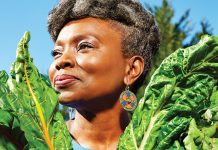
Photograph by Kevin D. Liles
To those who study Southern cuisine, Georgia native John T. Edge is something of a celebrity. Since I moved to Atlanta, any question I pose about field peas or collard greens is met with, “Have you talked to John T.?”
The director of the Southern Foodways Alliance, Edge has been studying Southern food culture for more than 20 years, and his latest book arrives on shelves May 16. The Potlikker Papers is a food history of the modern South, “the South that awakes from slumber in 1955 when the cooks and maids in Montgomery step off the buses and begin walking to work, rejecting Jim Crow,” says Edge.
Excuse me: John T. That’s what he prefers to be called. He reminded me of that when I called him at his “office,” a tin-roof tool shed in the backyard of his Oxford, Mississippi, home.
The book explores a big question: What is Southern food? What’s your answer?
Southern food is a kind of fitful dance between black and white. I think of it also as the proudest and best expression of this place. There are totemic dishes that define the region: Barbecue is one of them, fried chicken is one of them, cornbread is one of them, and so is potlikker. We did this together—despite adversity, despite our worst instincts—because of our best instincts. We created this beautiful cultural totem that actually happens to be deeply and profoundly enjoyable.
You say it’s a dance between black and white, but, ultimately, who does Southern food belong to?
Southern food is black food. Full stop. The first step in recognizing what Southern food is involves paying down a debt of pleasure to the cooks who have sustained us through the years, people like Mildred Council of Chapel Hill, North Carolina. At the same time, if I’m going to spend five years rooting around in the attic we call the South, I come out of it recognizing that the evolution of that food has been helped by white people, Mexican people, Vietnamese people . . . The people carrying Southern food forward are not of one color.
Can you name some Atlanta-based black cooks who deserve that debt of pleasure?
“Deacon” Lydell Burton, who practiced his craft in the heart of Inman Park. He was a television repairman, a Baptist deacon, and owner of the fried chicken restaurant Burton’s Grill. John Lewis invited him to D.C. to cook the dinner that celebrated Lewis’s election to congress in 1986. And there’s legendary author Edna Lewis, who was a mentor to Watershed’s founding chef, Scott Peacock. Miss Lewis taught me how to prepare shrimp paste—a little bit of nutmeg, a lot of butter—and stone-ground grits when I was living in Atlanta in the 1980s.
At the beginning of the book you write, “Southern food has become a shared culinary language for a nation now fixed on finding new meaning in its meals.” What is this meaning?
Southerners understand instinctively that their attraction to food is about more than just how crunchy the fried chicken is. My job, as a writer, is to explain that all meals come with servings of history, too. The history of racism is key.
Embedded in the fried chicken at Busy Bee in Atlanta is the story of former governor Lester Maddox and his fight to keep the Pickrick Cafeteria segregated. Order a barbecue plate at Fresh Air down in Jackson, Georgia, and that ’cue connects you to the mid-20th-century pit masters who worked the political rallies of demagogic Southern politicians. All that stuff’s there. It’s my job to complicate their barbecue sandwich.
In our December issue, outgoing Atlanta magazine restaurant critic Corby Kummer wrote about his disappointment that the city doesn’t have more black chefs and restaurant owners. “This a problem by no means confined to Atlanta,” he wrote, but “it should be one Atlanta takes the lead in solving.” Do you agree?
I do. There was this brief shining moment when Darryl Evans was the kingpin Atlanta chef at Azalea. His sizzling catfish with black bean sauce was a reflection of both Atlanta’s future as a mod, multicultural city and Atlanta’s past, when black cooks were recognized as skilled fry cooks.
But there’s a long, yawning gap after Evans, whose heyday was in the 1980s. The black men and women expected to inherit his legacy and carry it forward often did not have the money and power to grow their own restaurants. I think the basic problem is equity. Atlanta is a town that self-identifies as the nexus of the black American dream, and it has all the historical touchstones on which to draw. The questions are: How will Atlanta leverage that legacy of black achievement? Where’s the money to fund the next generation of black chefs? Where’s the equity?
What does the future of Southern food look like in Atlanta?
I would encourage people to think about what the South is and what the South is becoming. Crawfish Shack owner Hieu Pham is Vietnamese American. He was born in Grady Hospital, he calls himself a real Georgia peach, and he learned to cook crawfish at church camp meetings in south Louisiana. Heirloom Barbecue is owned in part by a former Korean pop star, Jiyeon Lee. Boiled crawfish and barbecue are two foods we think of as hyper-regional, hyper-Southern, and think about who is carrying them forward in Atlanta. That, to me, looks like a truer South on the horizon.
This article originally appeared in our May 2017 issue.













